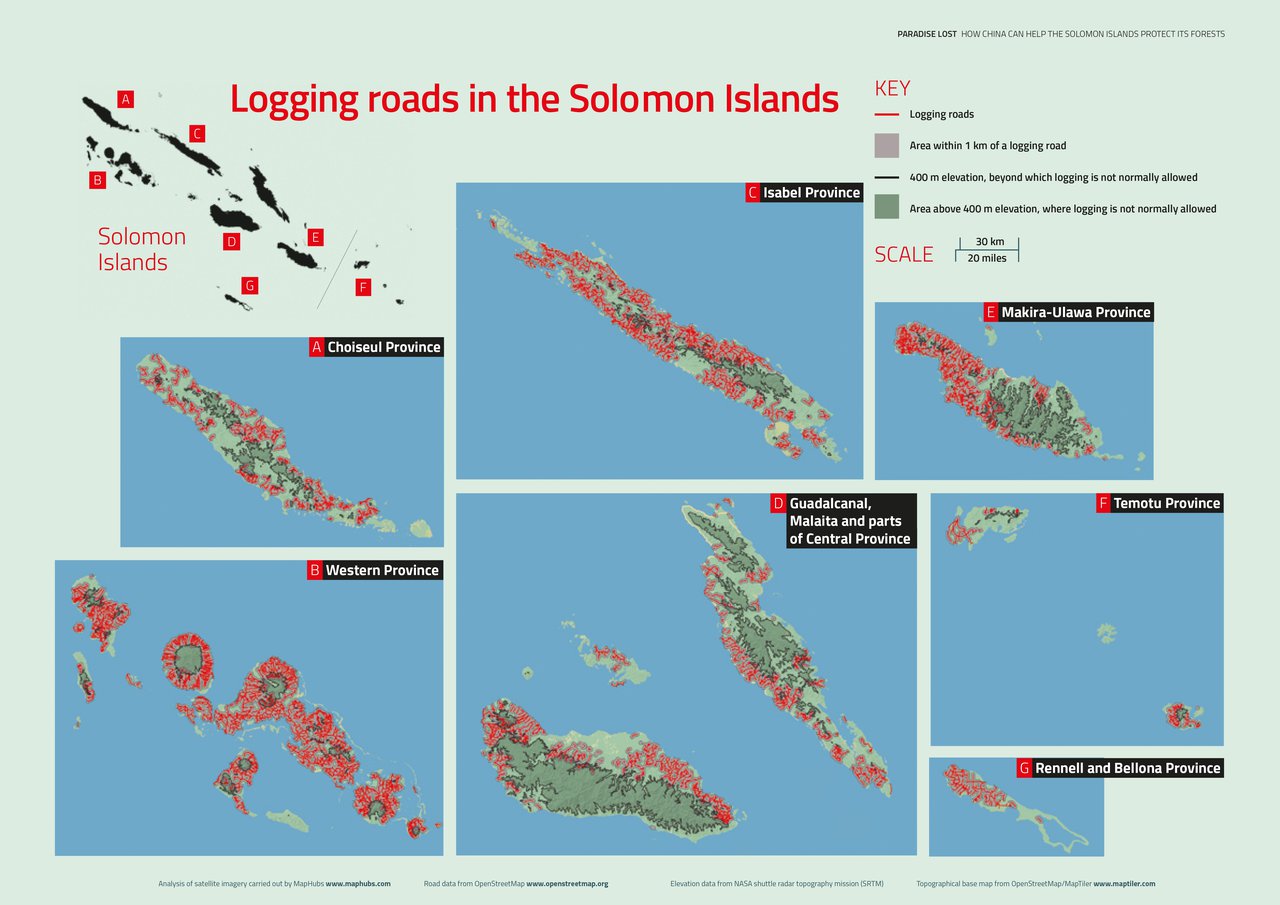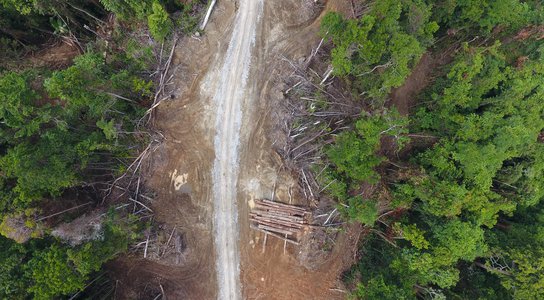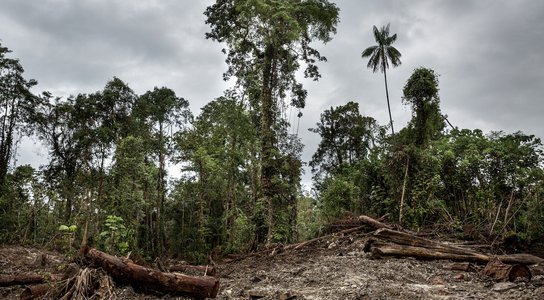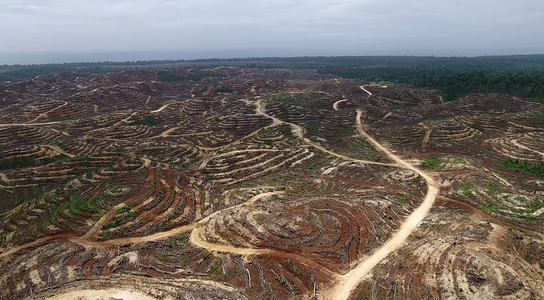At first glance, the Solomon Islands looks like a tropical paradise with palm-fringed white sand beaches and pristine, biodiverse rainforests. It’s advertised as being ‘untouched’ or ‘unspoiled’. But look closer and the paradise isn’t so idyllic.
Unsustainable logging at risk of illegality
Our new investigation, using detailed research, satellite imagery, drone photography and trade data, conclusively shows that tropical timber across the Solomon Islands is being harvested on an unsustainable scale, and that much of the activity driving this environmental destruction is at high risk of being illegal.
We mapped all the logging roads in the country and found that they cover a distance twice the length of China’s Yangtze River, despite the Solomon Islands being 338 times smaller than China.
Download our report Paradise Lost here [PDF]

Map of the logging roads in Western Province, Solomon Islands. To download a PDF of the logging roads of the whole country, click here.
If this carries on unchecked, it will have a devastating and irreparable impact on the country’s environment, and our global climate, already pushed to danger point, will suffer the added burden of losing more of the world’s carbon sinks.
What China can do
The fate of these islands, and the ensuing disastrous impact on our global environment, lies in the hands of China.
Virtually all of the Solomon Islands’ timber is exported to mainland China, and indeed this small group of islands is the country’s second biggest source of tropical logs, after Papua New Guinea. The two countries supply half of China’s tropical log imports and we found widespread risks of illegality in both countries’ forest sectors.
China is taking serious steps to address environmental degradation and to reduce pollution and carbon emissions at home. But the Chinese government is overlooking an important aspect of its ecological footprint: the raw materials that it sources from overseas.
China is the destination for about two-thirds of all tropical logs globally, many of which come from countries like the Solomon Islands that are struggling to address governance and rule of law issues.
As the most important actor in the global timber trade, if China continues to buy its wood with ‘no questions asked,’ it risks undermining efforts by its trading partners to improve governance, prevent environmental degradation, and achieve the UN Sustainable Development Goals.
By not questioning the illegal activity Chinese businesses are taking part in, China enormously increases the commercial and reputational risks to its businesses and those they trade with.
The #SolomondIslands in the South Pacific are under threat from illegal and unsustainable logging which is destroying its biodiverse rainforests at an alarming rate. But #China has the power to change this. Read more here: https://t.co/yPzOngumyR pic.twitter.com/oP57LGMktG
— Global Witness (@Global_Witness) October 18, 2018
How other countries could be affected
Most of China’s major wood trading partners - including the US, Japan, the UK, South Korea, Canada, Australia and Germany - have laws in place that require companies to check that timber was harvested legally in its country of harvest. The impact of this was seen in a recent $13 million fine of criminal charges to giant American flooring retailer, Lumber Liquidators, in relation to imports of flooring made in China using illegal wood.
Time is running out for China – both to protect the forests of the Solomon Islands it profits from, and its position as a leader in global environmental governance and a responsible global trade partner.
We call on China to require its timber importers to carry out checks to ensure that the timber they buy is, at a minimum, legal in its country of origin.
This report explores the unsustainability of this logging, the commercial and legal risks to business, how the timber trade in the Solomon Islands does little to benefit local people and how China, as the main importer of logs from the Solomon Islands, has a responsibility to act.
Key Facts
- The Solomon Islands is China’s second-biggest source of tropical logs (after Papua New Guinea), despite the fact that the Solomon Islands are only twice as big as Beijing.
- The Solomon Islands exported more than 3 million cubic metres of logs in 2017, more than 19 times a conservative estimate of the annual sustainable harvest.
- A recent report commissioned by the Solomon Islands’ Ministry of Finance suggested that if logging activities continue at their current pace, natural forests will be exhausted by 2036.
- Our new satellite imagery analysis shows that logging roads in the Solomon Islands are twice as long as the Yangtze River. In other words, logging roads in the Solomon Islands would take you from Shanghai to Tibet and back again, despite the fact that the Solomon Islands are 338 times smaller than China.
- China imports 82% of the logs the Solomon Islands exports.
- About half of China’s tropical log imports come from the Solomon Islands and Papua New Guinea
- The risks of illegal logging in the Solomon Islands are high enough that importers of uncertified Solomon Islands timber in the US and EU are unlikely to be able to meet their legal requirements without extensive site visits. Very few US or EU companies import timber direct from the Solomon Islands, but it is likely that companies importing timber from processing countries – principally China – may be importing Solomon Islands timber.
- More than half of lowland Solomon Islands is within 1 km of a logging road.
- One in every 20 km of logging road in the Solomon Islands is above 400 m in altitude, despite the fact that the Forest Act attempts to restrict logging in these areas by requiring companies to apply for special permission to log there.
- In 2017, the China Chemical Fibre Company and Jiangsu Modern Logistics each imported more than four times the amount of timber than the Solomon Islands can sustainably harvest.


